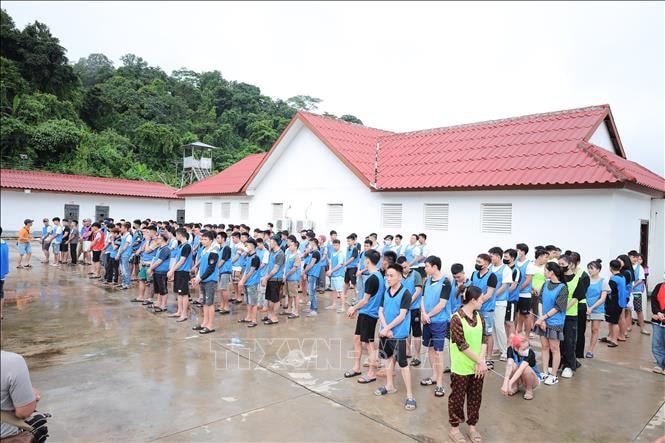Despite being vigilant, many people still lose millions to billions of dong when they "fall into the trap" of sophisticated high-tech scams.

Gone are the days when people would steal access to social media accounts and then impersonate the account owner to send messages asking to transfer money, borrow money or buy phone cards to send to them. Now, criminals are using more and more high-tech “tricks” and “following trends” according to “hot” social issues.
Accordingly, the subjects called people, introduced themselves as officials of state agencies (land officials, land registration offices, local police, social insurance, etc.) and asked people to declare and supplement citizen identification information, electronic identification accounts, etc. and directed people to connect to Zalo to guide them in installing applications, accessing fake websites (downloaded through links sent by the subjects, these applications and websites have functions or contain malicious code capable of collecting information, taking over the user's device), then taking over the victim's device and bank account and transferring all the money in the account to other accounts for appropriation.
Another trick of the scammers is to search for and collect personal information and personal relationships posted publicly on social media accounts, take old photos and videos of people... then use "Deepfake" technology (artificial intelligence technology) to create fake technology products in the form of audio, images, and videos. The subjects use those fake images and videos to make video calls to pretend to be relatives borrowing money, pretend to be children studying abroad calling their parents to ask them to transfer money to pay tuition, fake emergency situations that need to be transferred urgently... When committing fraud, the subjects will replay the video in a blurry, flickering form as if they were in a place with weak signal, making people believe it is real and transfer money to the subject to appropriate.
The latest trick of high-tech criminals is to search for information, images, and phone numbers of their "prey" (commonly images and information posted on social networking sites or social networking accounts), then they will cut and paste their faces into images cut from videos with sensitive content at motels and hotels and then contact them to blackmail...
It can be said that with the support of current technology, many forms of fraud are used by cybercriminals and there are always "updates" and changes in methods continuously. For example, to combat bank account hacking and "dispersal" of money, the banking industry has implemented biometric identity verification, but now there have been criminal tricks such as video calling via FaceTime, Zalo... to record the victim's image as data when hacking accounts.
According to the Department of Information Security (Ministry of Information and Communications), cyber attacks have increased significantly in recent months. In June 2024 alone, the country had 1,723 cyber attacks, an increase of 46.3% over the same period last year. Notably, in the first 6 months of 2024, the number of serious incidents that the Department of Information Security had to coordinate and handle increased by nearly 60% compared to the whole year of 2023.
The Vietnamese Penal Code has provisions on acts of taking advantage of cyberspace to defraud and appropriate property that can be prosecuted, with the highest penalty being up to 20 years in prison or life imprisonment. However, detecting and handling fraudsters is not easy at present. Because, almost all subjects and organizations that commit large-scale fraud are abroad and "extend their tentacles" into Vietnam to operate.
Furthermore, the fact that people or businesses are scammed is partly related to the disclosure of personal information. However, in addition to the disclosure of personal information due to people's carelessness in protecting and providing information to the subject, the problem of buying and selling personal information from organizations and individuals also needs to be strictly handled. Because this is a serious violation of the law, it is also an indirect form of assisting criminals, causing much frustration for the people.
In addition, units and businesses, especially those in the banking and financial sectors, need to promote information security, protect customer data, and avoid "leaking" to the outside.
Faced with the “dizzying” changes in fraud methods, the legal system and the enforcement team on high-tech crime prevention and control also need to be constantly updated, creating a “firewall” to promptly detect, prevent and handle violations. At the same time, State management of the Internet and telecommunications (especially management of phone SIMs) needs to be tightened further. Because currently, most fraud cases originate from phone calls via “junk SIMs” and this management still has many shortcomings.
At the same time, each citizen also needs to be proactively vigilant against scams targeting them. Accordingly, people need to be aware of the importance of protecting personal information, raising their vigilance, absolutely not following instructions from strangers calling; not accessing links provided by strangers via email, Zalo, Facebook...; not declaring personal information; not providing OTP codes; limiting the posting of personal information, images, videos or not sharing private images on social networks... In particular, people also need to report to the authorities when being scammed or suspected of being scammed so that they can isolate, detect and handle the scammers.